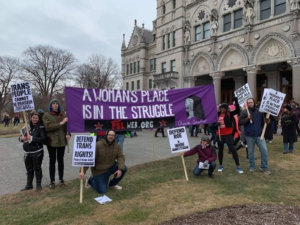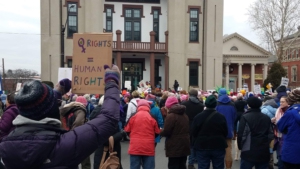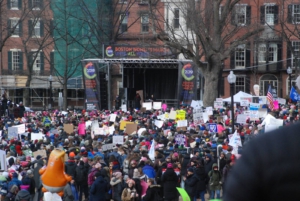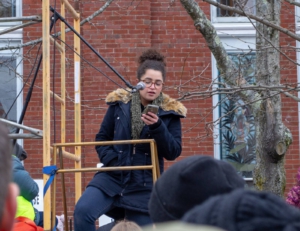Despite the bitter weather on Jan. 19, thousands of demonstrators across New England bundled up and gathered in their communities to protest
the ever-escalating war on women, armed with heavy scarves and hand-painted signs. On its third anniversary, the Women’s March expanded its message, focusing not only on violence against women, but also on justice for LGBTQ people, immigrants, and the environment, and for reproductive, civil and workers rights.
Mainstream media outlets jumped to report on this years “low” turn-out and paint the demonstrations as a failure, highlighting the public “controversy” regarding some of the event’s national organizers. Although some rallies turned out smaller numbers this year, others remained well attended, many featuring more progressive and diverse speakers than in years past. Members of the Party for Socialism and Liberation participated in Women’s Marches across the region, distributing educational material, inviting demonstrators to get involved in ongoing work in their communities, and played leadership roles in the organizing of a rally.
Not at the forefront of every event, but still significant, were women in grassroots organizations highlighting the Israeli occupation of Palestine, police brutality, and the struggles of trans and immigrant women.
Hartford, Connecticut

The energy for change at the Hartford Women’s March was as strong as it has been in past years with nearly 3,000 people braving the cold to march and rally.
In contrast to the past, more radical organizations led the march across downtown Hartford, around Bushnell Park to the state capitol. The banner of the Connecticut branch of the PSL was at the head of the march, with a portrait of anti-racist fighter Assata Shakur and the slogan “A Woman’s Place Is In The Struggle.” PSL organizers also carried signs highlighting the struggle for trans rights, including “Defend Trans Rights! Protect Trans Kids!” and “Trans People Cannot Be Erased!”
Many attendees displayed a renewed interest in socialism and revolutionary change.
Jaqueline Crockelle, an African-American graduate student and Hartford resident, held a sign that said, “Black Girls Matter, Too.” One speaker, a Connecticut doctor and the associate medical director for Planned Parenthood, called out the growing divide on healthcare outcomes. “We must dismantle the racism that is killing my patients,” Dr. Nancy Stanwood said. “That means equal access to jobs, housing, and education, and equal access to health care.”
The number of young people in attendance was also significant. One parent who came by the PSL table said as she hugged her son, “I’m here for his future.” The future was a growing theme of the afternoon as a number of younger speakers and activists worked the crowd building collective action. “We need more young people actively making change,” Connecticut activist Ashley Corrie, a high school student at her first Women’s March, told Liberation News. “We’ve seen what happens when women organize and now we are the future they are fighting for. This is for the women for today and tomorrow.”
Northampton, Massachusetts

The third annual Pioneer Valley Women’s March brought together thousands of protesters. Converging at noon in Sheldon Field, speakers reflected on women’s success in the past midterm election, then proceeded to march into downtown Northampton, where a second rally was held in front of the town hall.
Boston, Massachusetts

A sea of several thousand women and several hundred signs blanketed the freezing Boston Commons in a show of unification against the unapologetic sexism overflowing from the White House. Despite smaller crowds and limited demographics on the ground, trans women and women of color speakers were at the top of the program, presenting more radical ideas that were warmly received.
Scattered within the crowds was an assortment of local organizers, such as members of the Justice4Siham campaign and the PSL. At the Justice4Siham table, many became sympathetic to the struggle of Boston activist Siham Byah and her son, Naseem, who were separated more than a year ago when she was illegally deported by ICE. Members of the PSL Boston branch were warmly received while distributing flyers for a “Serve The People” supply drive, honoring the legacy and tradition of the Black Panther Party.
“Frankly, change happens by planting seeds,” Nadia Madden, a member of Muslims for Progressive Values, told Liberation News. “You plant them, you water them, it takes time, but it does happen.”
Nancy Murray, who marched with the 99% Contingent, has been active in many liberation struggles since the 1960s. Standing on the outskirts of the dense crowd, she held a hand-made sign demanding freedom for Palestine, and said “Having a lot of experience before the digital age in organizing, I’m a little concerned about the kind of organizing that’s done today. It’s very easy get people out in numbers by sending out, and having Facebook and Twitter, you know. But the organizing that needs to be done is face to face … It can only take you so far. There has to be real on-the-ground people, meeting each other and defining their goals very clearly, so it’s not so easy to divide people.”
Portsmouth, New Hampshire

Over 600 people gathered in Market Square in Portsmouth, N.H., for the third annual Women’s March. The rally was organized by over 20 different local community groups, including Occupy Seacoast, NH Youth Movement, Palestine Education Network, Union of Concerned Scientists, Young Organizers United, and members of the PSL. Ana Maria, a member of the PSL’s recently founded New Hampshire branch, chaired the organizing committee and delivered a powerful speech at the event.
In her very first sentence, simply uttering the word “socialism” provoked scattered cheers from the crowd. “Politicians will not concede to our progressive demands without an organized grassroots movement of people applying pressure on them.” she later said, eliciting more cheers. “Voting alone is not enough. Coming out to one march a year is not enough. We will only win through a protracted, collective, working-class struggle. Twenty-five thousand garment workers, mainly women and children, went on strike in Lawrence, Mass., in 1912 to demand living wages and safety on the job, and they won. Earlier this month, five million women marched in Kerala, India, to take a stand against sexist religious practices. Right this minute, more than 30,000 teachers in Los Angeles, Calif., are on strike demanding smaller class sizes, more librarians, more input from teachers in school operations and better working conditions. We live in the richest country in the world. So why do teachers have to scrape the bottoms of their own pockets to make sure their classrooms have enough supplies? Why are there more empty homes than people living on the streets? Why can’t we provide jobs at a living wage and high quality, free healthcare and public education? It doesn’t have to be this way.”
Rev. Sandra Pontoh spoke about Etty Tham, an immigrant woman who has been detained by ICE since May 2018 at the Strafford County Department of
Correction in Dover, N.H. “It is sad that while so many other people are not receiving paychecks because of the government shutdown, and when there are so many … people who are homeless, and foodless, that Immigration and Customs and Enforcement or ICE decided to keep spending the taxpayers’ money — and that is around $15,000 — to pay the Strafford County Jail for someone who should be released. And that is not right. That is not fair. Not only to Etty, not only to Etty’s family, but also it is not fair to you and to all of us here. So I invite you to keep fighting. Let us fight for the rights of all women, all immigrants, and all human beings.”
Palmira Wilson, co-founder of a Dover High School student group called D.R.E.A.M (Diversity, Respect, Educate, Advocate, Mission), told Liberation News, “My mom has co-workers that do the same job, but she gets paid less than her coworkers. I feel like my mom deserves more. I feel like women deserve more. So I’m not here just to stand up for myself. I’m here to stand up for my friends, for my family, and all women.”
Snow began falling as the Leftist Marching Band barreled into the middle of the crowd, wielding trombones, tubas, feather boas and twirling batons. The energetic group played a number of songs, including an upbeat rendition of “Somewhere Over The Rainbow” and “Sweet Dreams (Are Made of This)” and led the remaining protesters in a chant, “¡El pueblo unido jamás será vencido!” Demonstrators danced and sang, unfazed by the worsening weather.
An independent grassroots movement
The third annual Women’s Marches exemplified the ongoing need for for a truly independent women’s liberation movement. The character of each march was different, some containing participants or speakers with backwards views, but members of the PSL brought a revolutionary message in a variety of ways to thousands of people across New England and the country. Like any mass movement, a wide range of sometimes conflicting political perspectives were on display, but it is our duty as revolutionaries to involve ourselves in progressive struggles, build relationships, and raise the consciousness of broad sections of the working class. For attendees who came to the Women’s March looking to participate in more sustained work, the PSL was equipped with information about how to get involved in local campaigns. The focus on the struggles of Black women, Native women, trans people, and immigrants at this year’s Women’s Marches shows the increasing desire for a more radical politics. The fight against gendered oppression is central to the liberation of the entire working class. There is no women’s liberation without socialism, and no socialism without women’s liberation!




